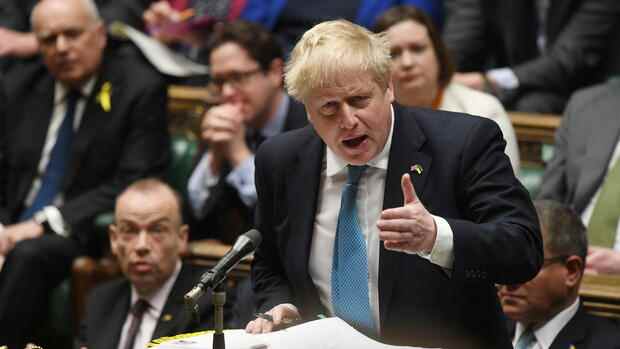It took a war for the British government to wake up. On Monday, Home Secretary Priti Patel launched a long-delayed white-collar crime bill. The lower house was to decide on the package in an urgent procedure that same evening. A broad non-partisan majority was considered safe.
“We don’t want dirty money in this country,” Patel explained. The law will not only affect the Russian oligarchs, but also their helpers in the London financial sector. The “biggest reform of the commercial register for 200 years” is planned.
Conservative Prime Minister Boris Johnson is suddenly in a hurry to fight the oligarchs. Because since Russia’s invasion of Ukraine, the British capital has once again been in the pillory. Over the decades, London has earned the nickname “Londongrad” because so many Russian super-rich have invested their sometimes illegally acquired fortunes there.
London became a second home for a number of billionaires associated with President Vladimir Putin: oil magnate Roman Abramovich bought Chelsea FC, Mikhail Fridman founded his private equity firm LetterOne, aluminum king Oleg Deripaska acquired at least one residence on the Thames.
Top jobs of the day
Find the best jobs now and
be notified by email.
And those are just the most prominent names. According to Transparency International, at least 150 British properties are owned by Russians who are accused of ties to the Kremlin or corruption. A parliamentary report three years ago concluded that the “London Laundromat” offers ideal conditions for money laundering: there is plenty of luxury property to buy and shell companies in British tax havens guarantee secrecy.
This should be over now. Home Secretary Patel announced a two-stage reform of corporate legislation. First of all, a register for foreign real estate owners is to be set up. All owners will be identified and the information updated every year, the minister said. Anyone who does not comply with the regulations must fear fines and imprisonment.
In a second step, the entire commercial register is to be reformed in autumn. Previously, anyone could register a company themselves on the Companies House website within minutes – without any controls. Going forward, the identity of each director and owner will be verified and published, Patel said. “No oligarch will ever be able to hide behind a British shell company again.”
Prosecutors don’t have enough resources
Non-governmental organizations such as Transparency International have been demanding this for years. If the reform were actually implemented, a major problem would be solved. However, members of parliament reacted skeptically, because when it comes to money laundering, the government’s rhetoric and reality often diverge.
There are still loopholes for lobbyists, criticized the Liberal Democrat Layla Moran. This would allow owners to remain anonymous if the government concluded it was in the UK’s economic interest to do so.
Previous owners should also have six months after the law comes into force to provide the required information. Several MPs complained that this gave the Russian oligarchs far too much time to rearrange their affairs. It was also pointed out that the budget of the competent authority, the National Crime Agency (NCA), has been cut in recent years.
Experts have long criticized that existing anti-money laundering laws are not consistently enforced. “Unfortunately, the authorities don’t have enough resources,” Tom Keatinge, director of the financial crime center at London think tank RUSI, told the House of Commons Finance Committee on Monday.
Britain has sanctioned few oligarchs
The NCA already has two departments for money laundering and corruption, Keatinge said. But they were reluctant to take action against oligarchs because they feared expensive lawsuits. “The laws are not bad, but we don’t devote enough resources to the issue,” said the expert. There is no point in passing new laws if you don’t also significantly increase the government budget.
Patel promised in Parliament to provide more money – but without being specific. The legal costs for the authorities will also be limited so that they do not have to fear ruinous processes.
The British government has been under pressure for days because it has so far only sanctioned a few oligarchs. While the US and EU have each sanctioned hundreds of people, the UK list has fewer than a dozen names. Critics also complain that the first yachts have already been confiscated in the EU, while nothing has happened in London.
Lords have watered down money laundering legislation
This is because the sanctions laws in the EU have fewer requirements, Foreign Secretary Liz Truss said on Monday in the Foreign Affairs Committee. “We have a cumbersome sanctions process.” For example, some Lords in the House of Lords built in several legal hurdles in the last money laundering law in 2018, which now means a longer examination if sanctions are to stand up in court.
If the new law comes into force as planned, however, things will go much faster, Truss said. Then Great Britain could copy the US and EU sanctions lists as early as March 15. Among other things, it should then be possible to impose sanctions on entire groups (such as members of the Duma).
How far-reaching the action against the oligarchs turns out in the end depends heavily on the small print in the law. In any case, doubts about Johnson’s determination are appropriate. Such is the lobbying power of the global billionaire class in Britain’s government district that no prime minister has made any serious attempt to shut down the ‘London Laundromat’.
However, the oligarchs living in London are already feeling their new pariah status in everyday life: According to the Sunday Times, Fridman was recently unable to pay a £200 medical bill. The reason: His credit card stopped working.
More: These oligarchs are on the sanctions lists – and they are still missing.
